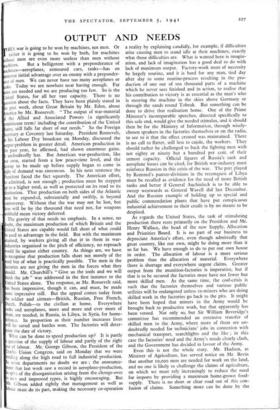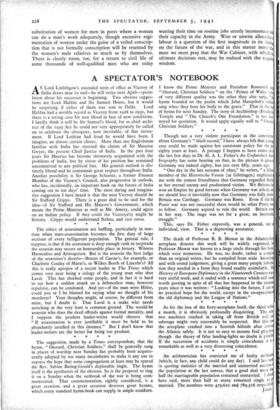OUTPUT AND NEEDS
HIS war is going to be won by machines, not men. Or rather it is going to be won by both, for machines ithout men are even more useless than men without achines. But a belligerent with a preponderance of achines—aeroplanes, armoured cars, tanks—has an mense initial advantage over an enemy with a preponder- ce of men. We can never have too many aeroplanes or nks. Today we are nowhere near having enough. Far ore are needed and we are producing too few. So is the 'nited States, for all her vast capacity. There is no uestion about the facts. They have been plainly stated in e past week, about Great Britain by Mr. Eden, about merica by Mr. Roosevelt. " The output of war-material f the Allied and Associated Powers [a significantly eminiscent term] including the contribution of the United aces, still falls far short of our needs." So the Foreign ecretary at Coventry last Saturday. President Roosevelt, his Labour Day broadcast on Monday, discussed the utput-problem in greater detail. American production in he past year, he affirmed, had shown enormous gains. t undoubtedly has. But American war-production, like ur own, started from a low peace-time level, and the eway to be made up before supply began to come in ght of demand was enormous. In his next sentence the resident faced the fact squarely. The American effort, e admitted, is not enough ; production must be stepped p to a higher total, as well as protected on its road to its estination. That production on both sides of the Atlantic ust be expanded, substantially and swiftly, is beyond ontroversy. Without that the war may not be lost, but yes will be by the thousand that need not, for weapons ithheld mean victory deferred.
The gravity of that needs no emphasis. In a sense, no oubt, the maximum production of which Britain and the Tufted States are capable would fall short of what could e used to advantage in the field. But with the maximum tined, by workers giving all that ig in them in war- ndustries organised to the pitch of efficiency, no reproach could lie against either country. As things are, we have o recognise that production falls short not merely of the eed but of what is practically possible. The men in the actories are not giving the men in the forces what they hould. Mr. Churchill's " Give us the tools and we will nish the job " was addressed in the first instance to the 'nited States alone. The response, as Mr. Roosevelt said, as been impressive, though it can, and must, be made ore impressive still. But the appeal comes today from he soldier and airman—British, Russian, Free French, utch, Polish—to the civilian at home. Everywhere auks and aeroplanes, more and more and ever more of em, are needed, in Russia, in Libya, in Syria, for home- efence. In proportion as their number increases lives 11 be saved and battles won. The factories will deter- ne the date of victory.
What can be done to speed production up? It is partly question of the supply of labour and partly of the right e of labour. Mr. George Gibson, the President of the rades Union Congress, said on Monday that we were 'ding along the high road to full industrial production. El some departments no doubt we are ; the announce- ent. that last week saw a record in aeroplane-production, spire of the disorganisation arising from the change-over 0 new and improved types, is highly encouraging. But ir. Gibson added rightly that management as well as abour must do its part, making the necessary co-operation a reality by explaining candidly, for example, if difficulties arise causing men to stand idle at their machines, exactly what those difficulties are. What is wanted here is imagin- ation, and lack of imagination has a good deal to do with lack of maximum output. Factory-work must of necessity be largely routine, and it is hard for any man, tied day after day to some routine-rprocess resulting in the pro- duction of one out of ten thousand parts of a machine which he never sees finished and in action, to realise that his contribution to victory is as essential as the man's who is steering the machine in the skies above Germany or through the sands round Tobruk. But something can be done to drive that realisation home. One of the Prime Minister's incomparable speeches, directed specifically to this sole end, would give the needed stimulus, and it should then be for the Ministry of Information, through wisely- chosen speakers in the factories themselves or on the radio, to see to it that the effect created was maintained. There is no call to flatter, still less to cajole, the workers. They should rather be challenged to back the fighting men with not eighty or ninety but a hundred per cent. of their utmost capacity. Official figures of Russia's tank and aeroplane losses can be cited, for British war-industry must reinforce Russian in this crisis of the war. The part played by Rommel's panzer-divisions in the reconquest of Libya must be recalled as evidence for the need of more British tanks and better if General Auchinleck is to be able to sweep westwards as General Wavell did last December. And the Russian example of holding up to special and public commendation plants that have put conspicuous industrial achievement to their credit is by no means to be despised.
As regards the United States, the task of stimulating production there rests primarily on the President and Mr. Henry Wallace, the head of the new Supply, Allocation and Priorities Board. It is no part of our business to depreciate America's effort, even though admittedly that great country, like our own, might be doing more than it so far has. We have enough to do to put our own house in order. The allocation of labour is a more serious problem than the allocation of material. Everywhere there is shortage and everywhere urgent claims. Greater output from the munition-factories is imperative, but if that is to be secured the factories must have not fewer but more skilled men. As the same time, the coal-crisis is such that the factories themselves and various public utilities will be endangered unless ex-miners who are doing skilled work in the factories go back to the pits. It might have been hoped that miners in the Army would be brought back to productive work, but that apparently has been vetoed. Not only so, but Sir William Beveridge's committee has recommended an extensive transfer of skilled men to the Army, where more of them are un- doubtedly needed for technicians' jobs in connexion with mechanical transport, searchlights and the like ; in this case the factories' need and the Army's needs clearly clash, and the Government has decided in favour of the Army.
Even this is not the whole story. Mr. Hudson, as Minister of Agriculture, has served notice on Mr. Bevin that another xo,000 men are needed for work on the land, and no one is likely to challenge the claims of agriculture, on which we must rely increasingly to reduce the need for imports by providing a maximum home-grown food- supply. There is no short or clear road out of this con- fusion of claims. Something more can be done by the substitution of women for men in posts where a woman can do a man's work adequately, though excessive regi- mentation of women under the guise of a veiled conscrip- tion that is not formally conscription will be resented by the women's male relatives as much as by themselves. There is clearly room, too, for a return to civil life of some thousands of well-qualified men who are today
wasting their time on routine jobs utterly inconsonant their capacity in the Army. Wise or unwise allocation tj labour is a question of the first magnitude in its beariii on the future of the war, and in this matter more thin most we must pray that the War Cabinet, with which dl ultimate decisions rest, may be endued with the requisii wisdom.



























 Previous page
Previous page